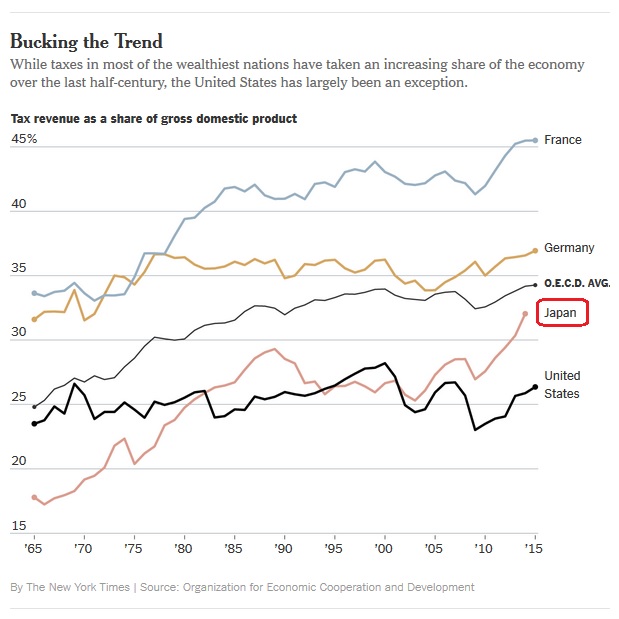It’s hard to be optimistic about Japan’s economic future, in large part because the burden of government is expanding thanks to an aging population and a tax-and-transfer entitlement system.
Maintaining that approach is a recipe for ever-higher taxes (especially since Japan already has record levels of debt).
And Japanese politicians definitely have been grabbing more money, enabled to a considerable extent by a money-grabbing value-added tax.
To make matters worse, the country’s economy has not enjoyed much growth ever since a bubble burst about thirty years ago.
Sadly, the current prime minister, Fumio Kishida, doesn’t seem to have any sensible ideas for his country.
Instead, as reported by Ben Dooley and in the New York Times, he’s latched on to a very silly proposal.
Japan’s prime minister…wants…to…Give…employees a substantial raise. The reasoning is simple. Wage growth has been stagnant for decades in Japan, the wealth gap is widening and the quickest fix is nudging people…to pay their employees more. Higher wages, the thinking goes, will jump-start consumer spending and lift Japan’s sputtering economy. …the prime minister is calling on employers to increase pay as much as 4 percent in 2022. Companies that comply will be allowed to increase their overall corporate tax deductions by up to 40 percent. …Mr. Kishida said…Increasing pay “is not a cost,” he added. “It’s an investment in the future.”
Kishida’s scheme is a bizarre mix of industrial policy and Keynesian economics.
He wants a special loophole in the tax code, but only if companies jump through certain hoops.
All based on the flawed notion that consumer spending drives the economy (it’s actually the economy that drives consumer spending).
Unsurprisingly, the private sector isn’t very impressed by the prime minister’s approach.
Business groups, union leaders and others have questioned the feasibility… That businesses would resist increasing wages even when essentially paid to do so shows just how intractable the problem is. Years of weak growth…have left companies little room to raise prices. …The reaction to the wage proposal is an inauspicious sign for Mr. Kishida, who took office two months ago promising to…put Japan’s economy back on track through a “new capitalism.”
Kishida’s “new capitalism” sounds even worse than some of the gimmicky ideas that have been pushed on the right in the United States (reform conservatism, common-good capitalism, nationalist conservatism, and compassionate conservatism).
From an economic perspective, he needs to learn that sustained higher wages are only possible if there’s more productivity, which translates into more income for both companies and workers.
And that’s not a description of what we find in Japan.
…there is the issue of unprofitability. For nearly a decade, a majority of Japanese businesses have been unprofitable — around 65 percent in 2019, the lowest figure since 2010. They have been kept afloat by cheap money underwritten by the Bank of Japan, but no profits mean no corporate tax liability, so those businesses would not be eligible for Mr. Kishida’s incentives.
The bottom line is that Japan’s political elite has been marching steadily in the wrong direction, and they never seem to learn from previous mistakes.
The government has long tried to find something, anything, to stimulate the economy and push up prices. It has pumped money into financial markets and made borrowing nearly free. But it’s been to little avail…the Japanese government has turned to even larger amounts of stimulus, showering consumers with cash handouts and companies with zero-interest loans. …In 2013, Prime Minister Shinzo Abe introduced a similar plan, with little success. Today, average wages remain stuck at around $2,800 a month, about the same level as two decades ago.
P.S. Part of the problem is that Japanese politicians may be listening to terrible advice from left-leaning bureaucracies such as the International Monetary Fund and Organization for Economic Cooperation and Development.
P.P.S. Here’s another example of a foolish gimmick by Japanese politicians.
P.P.P.S. And let’s not forget that Japan may win a prize for the strangest example of regulation.


No comments:
Post a Comment